Two upcoming papers discuss the concept of a carbon quota, that is, a limited amount of carbon that can be released to the atmosphere in order to remain below a certain global warming target. The first paper, published in Nature Geoscience, indicates that we have already used up two thirds of the carbon quota needed […]
Tag: climate change
Climate change: cropland could expand in Canada
A new simulation of the impact of climate change on the supply of agricultural land shows that suitable cropland will expand in Canada, Russia, China and other countries in the high latitudes of the Northern hemisphere. On the other hand the authors project a significant loss of highly fertile cropland in the Mediterranean regions and […]
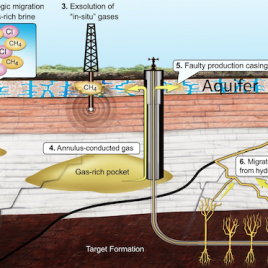
Tracing groundwater contamination above shale gas fields
A new study shows that methane leaks in drinking water wells around shale-gas wells in Pennsylvania and Texas come from failures in the integrity of gas well construction, and not from the drilling or hydraulic fracturing. The authors developed a new technique to look for the concentration of noble-gas isotopes in drinking-water samples to determine […]
Resistance of the boreal forest to fire
A new study shows that the boreal forest could be more resilient to forest fire than previously thought. Using climate projections, scientists estimate that forest fire in the Boreal forest in Canada will be bigger and happen more frequently by the end of the 21st century. However, a careful study of the past 200 years […]
Calculating the impact of a “Green Revolution”
New research suggests that improving crop yields has reduced carbon emissions and land use worldwide, but that this might not be the case in the future. The “Green Revolution” refers to the use of fertilizers, pesticides and other agricultural technology to increase crop yields. Previous studies have shown that rather than decreasing the amount of land […]
Polar vortex linked to Arctic sea-ice loss
The loss of Arctic sea-ice may be responsible for the weakened polar vortex and cold Northern Hemisphere winters observed in recent years, a new study shows. The researchers conducted observational analyses and model experiments to reveal a link between Arctic sea-ice loss and polar atmospheric circulation. Researchers showed that decreased sea-ice cover during November and December […]
Toronto air pollution slowly getting better
Efforts to curb air pollution in Canada’s largest city are having an effect, although there’s still room for improvement, according to a new study. Researchers analysed data from provincial and federal monitoring programs and found that between 2004 and 2012, levels of both nitrogen oxides and volatile organic compounds (VOCs) decreased by about half. However, […]
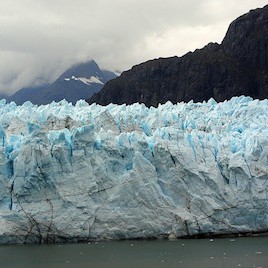
Is it our fault that glaciers are retreating?
A new paper helps quantify how much of the global loss of glaciers can be attributed to human activity as opposed to natural variation in earth’s temperature. The study uses a mathematical model to compare the amount of glacier melt that would have been expected based on natural and man-made forcings to the actual amount. […]
Mercury is rising in the oceans
Mercury levels in the ocean have more than tripled in some regions as a result of human activity, a new study reports. Researchers measured mercury levels during several recent expeditions to the Atlantic, Pacific, Southern and Arctic oceans. The research team found that mercury content of surface water had three times the amount of mercury compared […]
Scientists propose ‘roadmap’ to determine the impact of fracking
An international review highlights the knowledge gaps related to the ecological consequences of shale gas development, and sets priorities for future research. The authors point out that shale-drilling operations have increased by more than 700 per cent in the United States since 2007 and that it has occurred mostly in areas of biological diversity, yet […]
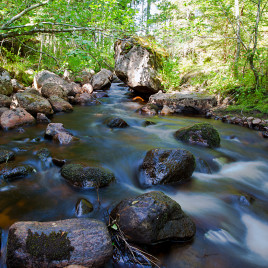
Streams in the boreal forests emit more CO2 than previously thought
Streams in the boreal forest emit more carbon dioxide than previously thought, a new study shows. Researchers discovered that previous studies on CO2 emissions from lakes and groundwater only studied the endpoints of streams and rivers. Studying carbon isotopes ratios from various points in groundwater allowed the researchers discovered previously unaccounted for CO2 emissions. The boreal forest […]
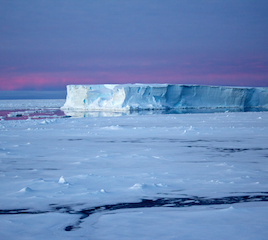
Overestimation of Antarctic sea ice expansion
A new study says that the measured expansion of sea ice in the Antarctic may be due to an error in the way satellite data is processed as recent observations show the ice is actually retreating. Comparing past and present datasets revealed a difference between the two records. The current data shows much faster sea ice expansion […]
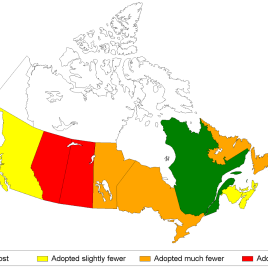
What’s the greenest province in Canada?
Researchers measuring pro-environmental behaviour in Canada at the household level found that British Columbia and Québec lead the pack. The study was conducted using the answers to 39 questions on the 2007 Environment Survey of Statistics Canada. They found out that households in British Columbia, Quebec, Prince-Edward-Island and Nova-Scotia were the greenest opposed to Alberta, […]
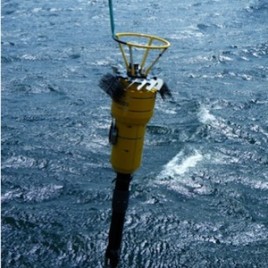
Wind in Southern Ocean influences mixing of the deep ocean
A new study shows that winds in the Southern Ocean near Antarctica influence the rate at which deep ocean waters – which act as a key reservoir for heat, carbon and nutrients – mix with the shallower waters above them. Using data from 20 years worth of satellite and probe-based measurements, researchers mapped out how […]
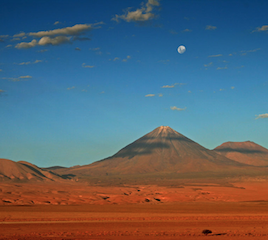
Record levels of solar ultraviolet measured in South America
A team of researchers has measured the highest level of UV radiation ever recorded on Earth’s surface. On December 29, 2003, the UV index peaked at 43 at the summit of Licancabur volcano (5,917 meters high) and near Laguna Blanca (4,340 meters high) in Bolivia. In comparison, the UV index in Toronto never exceeded […]
Expert Comments – Carbon Impact of Keystone XL
A study published Sunday in Nature Climate Change uses an economic model to quantify the potential impact on greenhouse gas emissions resulting from the proposed Keystone XL pipeline, which would transport crude oil from Canadian oil sands projects to refineries in the US. The authors say that previous analyses did not adequately account for the ways […]